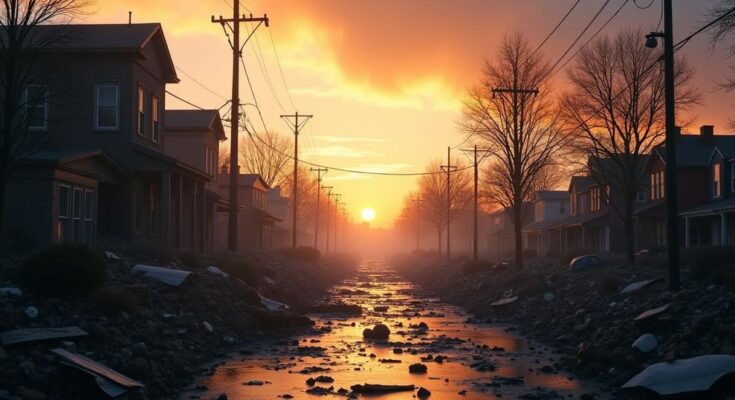Hurricane Helene has claimed over 210 lives, making it the second deadliest storm to hit the U.S. in fifty years. President Biden visited affected states to offer support. The storm caused severe flooding and destruction, especially in North Carolina, where many remain unaccounted for. Experts link the storm’s severity to climate change, reinforcing ongoing concerns about extreme weather events.
On October 3, it was reported that the death toll from Hurricane Helene has exceeded 210, marking it as the second deadliest storm to impact the United States mainland in over fifty years. The storm severely affected several states including North and South Carolina, Georgia, Florida, Tennessee, and Virginia, leaving vast areas devastated. President Joe Biden, in a display of solidarity, visited affected regions to offer condolences and support to those enduring this catastrophic experience. The storm caused significant flooding, rendered numerous roads inaccessible, and disrupted essential services like electricity and water. North Carolina, particularly hard hit, accounted for more than half of the total fatalities, with officials describing the aftermath as unprecedented and, at times, post-apocalyptic in nature. During his visit to Ray City, Georgia, President Biden expressed his empathy, stating, “I see you, I hear you, I grieve with you – and I promise you, we have your back.” In the wake of this disaster, which has brought memories of the devastating Hurricane Katrina of 2005 to the forefront, rescue efforts continue as authorities search for additional survivors. The mountainous regions of North Carolina, particularly Buncombe County, remain challenging environments, with landslides obstructing access to isolated communities. In Asheville, mud-covered streets and destroyed buildings depict the magnitude of the storm’s impact. Despite the devastation, local communities have rallied around each other, aiding in the cleanup efforts and providing support for those affected. As President Biden noted during his aerial tour of Florida’s northern Gulf Coast, the destruction left families devastated, having lost not just their homes but also their loved ones. Experts attribute the rapid intensification of Hurricane Helene to climate change, linking it to warmer ocean temperatures that provide storms with additional energy. Biden asserted that denying the climate crisis is irrational, reinforcing the notion that such natural disasters are becoming increasingly frequent due to environmental factors. Conversely, former President Donald Trump, amidst a campaign event, criticized the federal response, inaccurately claiming that help was insufficient for those affected by the disaster. The Sierra Club highlighted the role of climate change in the hurricane’s destructive ability, with Executive Director Ben Jealous stating, “Make no mistake: the unimaginable devastation we’re seeing across the Southeast is the climate crisis in action.”
The article discusses the devastating impact of Hurricane Helene, which has led to a confirmed death toll of over 210 across multiple states in the United States. President Biden’s visits to affected areas exemplify governmental support amidst a significant disaster recovery effort. The article further delves into local and federal responses to the crisis, emphasizing the role of climate change as a critical factor in the storm’s intensity and the subsequent destruction.
In conclusion, Hurricane Helene has emerged as one of the deadliest storms in recent U.S. history, underscoring the catastrophic consequences of extreme weather events exacerbated by climate change. With over 210 confirmed fatalities and extensive destruction across several states, the importance of robust emergency response and community resilience is highlighted. The federal government, under President Biden’s leadership, has pledged support for recovery efforts, while ongoing discussions about climate change continue to shape the narrative surrounding such natural disasters.
Original Source: www.lemonde.fr




